#this just makes me want to watch ehb
Text
˚₊·˚ “babes” | ot7 ˚₊·˚
↬ pairing: ot7 x reader
↬ genre: fluff | drabbles | scenarios
↬ warnings: none
↬ w/c: 1.3k
↬ requested by: 🤍
↬ request was: Hihii I was wondering if you could do enhypens reaction to calling them things like baby or my love in your native language (excluding English and Korean)
↬ a/n (a few things !!)
since i clearly don’t what “my love” in everyone’s native language “babes” is the place holder word and you can imagine it as whatever “my love / love” is in your language !! also i haven’t done an ot7 post in a while so these might be kinda bad and lowkey might not make any sense 💔
also, the 500 followers event is closed (unless you decide to send one in tonight then i’ll still write it 👀 !! ) but somehow we hit 800 followers today !! how this blog managed to get like 200 followers while i was ia is beyond me 😭
but thank you everyone 🥺 i’ll be writing requests from the 500 followers throughout the week and responding to asks as well <33

˚₊·˚♤˚· lee heeseung ˚₊·˚♤˚·
late one night you and hee are laying in bed, unable to sleep so you ask him,
“babes, wanna eat some ramen?” he’s like yes, ramen !! but wait,
“babes?” he asks. “isn’t that fish in russian?” (like that whole “te amo” means “i love you” in tagalog / filipino even though it actually means ‘i love you’ in spanish. but yeah, he’d probably think it was something completely different in another language lmao) once you realized what you just called him you tell him,
“it doesn’t mean fish, it means love in [insert your language].” the dots connect in his head and all of a sudden,
“i babes you,” you hear. you can’t help but smile at him and laugh a little because,
“that’s not how the grammar works, but at least you tried.” from then on if he wanted something from you he’d do aegyo and would say.
“babes, please !!”
˚₊·˚✎˚· park jongseong / jay | self indulgent jay mini fic somewhat related to this req ˚₊·˚✎˚·
you’re chilling with jay one day and all of a sudden,
“hey, babes can you hand me the remote?” you ask. suddenly he’s frozen in place, looking at you like,
“did you just call me love in [insert your language]?” you look at him, slightly tilting your head to the side and you’re all like,
“huh, i guess i did.” in his head, his mind is going crazy because what ?? you l-word him ?? but then you’re just like,
“wait, how do you know what that word means?” and then he gets all flustered and begins to ramble.
“i went on a YouTube spiral at four am, and, uh… uhh… yeah, i just heard it. it sounded unique so i sorta just remembered.”
“when?”
“like, a few weeks ago.”
“what were you watching?”
“the basics to [insert your language] 101.” you’re shocked but not really since jay is basically a language genius. but now your heart feels all fuzzy and warm because he’s learning your language.
˚₊·˚ ✁˚· sim jaeyun / jake ˚₊·˚ ✁˚·
if anything, you probably didn’t call him babes first. why? because you said it to layla. you stopped by jake’s place before the both of you went to your parent’s place. since you haven’t seen layla in a while, she instantly captured your attention (like she so rightfully deserves).
“babes, i missed you!” you say as you smile while petting her and seeing her tail wag in happiness. jake looks at the sight of the two loves of his life and can’t stop the way his heart flutters a little. he doesn’t want to ruin the moment but he wants your attention so he ends up sort of sitting on the ground next to layla and peeks up at you with wide eyes and a smile.
“babes?” he asked. you end up also sitting on the floor, layla settling onto your lap,
“it means love in [insert your language].” he frowns,
“you said you love layla before saying you love me?”
“who says i love you?” he gets kind of pouty because he knows that you love but he wants to hear it. some time passes and when you’re at your parent’s house, you’re talking to them and you tell them in [insert your language],
“i love jake.” he hears the word and his name in the same sentence. so he takes a chance and using the same sentence you said but with your name he says,
“i love ___.”
˚₊·˚ ❆˚· park sunghoon ˚₊·˚ ❆˚··
it probably slipped out in a moment of panic while the two of you were ice skating. sometimes you slipped into [insert your language] due to a surge of various emotions, sometimes anger, fear, or frustration. sunghoon had asked if you wanted to go on a date to the new rink that just opened and you said yes because ice skating with hoon, how could you miss the opportunity ?? he was holding your hand and skating to your pace trying to teach you how to ice skate. but somewhere down the line, he ended up letting go without you realizing it (like when you ride a bike and the person behind you holding the bike lets go !!) so you turn around, eyes wide at the distance between you and sunghoon and you’re like,
“YAH, BABES YOU SAID YOU WOULDN’T LET GO,” and all of a sudden you lose your balance. thankfully, sunghoon being the great skater that he is manages to get to you and holds so you so that you don’t fall. you’re clutching onto his jacket, trying to catch your breath, “i hate you,” you mutter. he smiles as he moves your hair to get out of your face,
“yeah, keep telling yourself that. wait? what does babes mean?” he asks.
“it means love in [insert your language].” suddenly, ice king composure melts. heart going a hundred miles a minute. mind is all like wait what? he accidentally loses his footing and balance, falling while taking you down with him but you’re fine since you landed on top of him.
“are you ok, babes?” he asks to at least try and keep some cool because even though you’re in an ice skating rink, it suddenly feels as if things just got a hundred degrees hotter.
˚₊·˚❂˚· kim sunoo ˚₊·˚❂˚·
he had been interested in learning about your language and culture, mostly for the food… but a+ for effort, right? he would often ask you, “what does this mean?” “what does that mean?” that kind of stuff, since he was genuinely curious. he picked up a few words here and there, occasionally using a word that he knew in a sentence while talking to you. your family asked you to bring him over for a family gathering / party situation sometimes it felt like they liked him more than you. you were sitting down with a plate of food,
“babes, can you hand me a napkin?” suddenly, your and sunoo’s ears are filled with the sounds of “OOO” and your family begins teasing you. to yourself, you’re just like, did i really just call sunoo… but when you look at sunoo his smile is the widest it’s ever been
“you called me love, matji, matji?” (matji meaning like “right” in korean, idk it just felt right to spell that out here ok anyways)
“how did… how did you know?” and he does that thing where he kind of giggles,
“you just confirmed it!”
˚₊·˚✧˚· yang jungwon ˚₊·˚✧˚·
one night jungwon was dropping you off to the front of your doorstep to make sure you got home safe and sound. you were trying to be cute and said,
“saramhae” (saram means person in korean, but what you really meant to say was, “saranghae” which means i love you in korean). jungwon then does that thing where he smirks at you, tilting his head slightly, and he says,
“nado saramhae, babes.” (so like “i love you too, [love in insert your language]” but it’s saramhae because that’s what you said at first) but then,
“babes?” you ask. he plays it off by saying,
“i’m the leader, i need to learn how to communicate in different languages for engenes.” but really it’s just secret language learner pt. 2 exposed.
˚₊·˚⍢˚· nishimura riki / ni-ki ˚₊·˚⍢˚·
ni-ki’s head was on your lap, eyes closed since he was taking a nap and decided your lap was the best thing to claim as his pillow. you needed to get up so to wake him, you poked his cheeks,
“ni-ki,” you said. nothing.
“riki-ah?” this time as more of a question while lightly patting his hair. also nothing.
“babes, if you don’t wake up i’m gonna shove you off my lap.” suddenly, his eyes open and he looks up at you which causes you to jump back in your seat slightly.
“bae-ehbs?” he asks, trying to sound out the word.
“uh huh.”
“wait doesn’t that mean, love?”
“no… it means pabo,” you reply playfully. (pabo meaning like dum dum / stupid in korean, but it’s not meant to sound offensive here !!)
“no it means ‘love’ jay hyung told me about that word when i started dating you.”
“well, if you knew then why’d you ask?”
“wait, so it actually does mean love?”
“you just said jay told you!”
“yeah but i didn’t believe him.” at the confirmation of the word’s true meaning, he feels happy and kind of giddy at the new name he’s earned for himself from you. like heeseung, he’d use it to get something that he wants from you but instead of aegyo it’s more like teasing.

↬ a/n pt. 2 + semi tmi: i speak two languages and i suck at both, english and my parent’s native language. two & a quarter if you count the bare minimum of spanish i learned from taking it during the first two years of high school and the few words of korean i picked up from kdramas lmao 😭
❦ written by riri ( @enhykkul ) | blog masterlist | blog navigation
↬ tagging: @bloom-bloom-pow | @markleepooh | @sunshineshouchan (permanent taglist is open if anyone wants to be in it !!)
#enhypen imagines#enhypen fluff#enhypen drabbles#enhypen scenarios#enhypen x reader#enhypen ot7#enhypen ot7 fluff#lee heeseung imagines#park jay imagines#sim jake imagines#park sunghoon imagines#kim sunoo imagines#yang jungwon imagines#nishimura riki imagines#ni-ki imagines#lee heeseung x reader#park jay x reader#sim jake x reader#park sunghoon x reader#kim sunoo x reader#yang jungwon x reader#nishimura riki x reader#ni-ki x reader#park sunghoon fluff#park jay fluff#park jongseong imagines#sim jaeyun imagines#yang jungwon fluff
299 notes
·
View notes
Photo
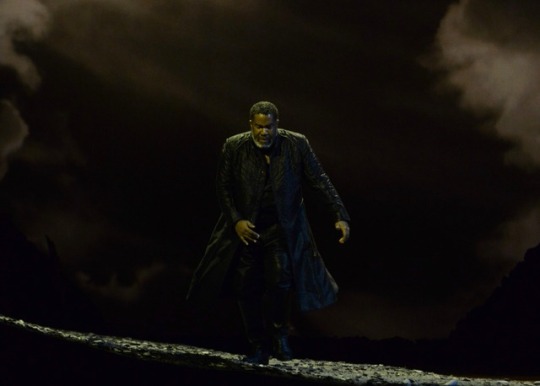
OPERA / 2017-2018
DON CARLO
OPEN REHEARSAL
Washington National Opera
Music by Giuseppe Verdi
Libretto by Joseph Méry and Camille Du Locle
Translated into Italian by Achille de Lauzières and Angelo Zanardini
Based on Friedrich von Schiller’s dramatic work Don Carlos
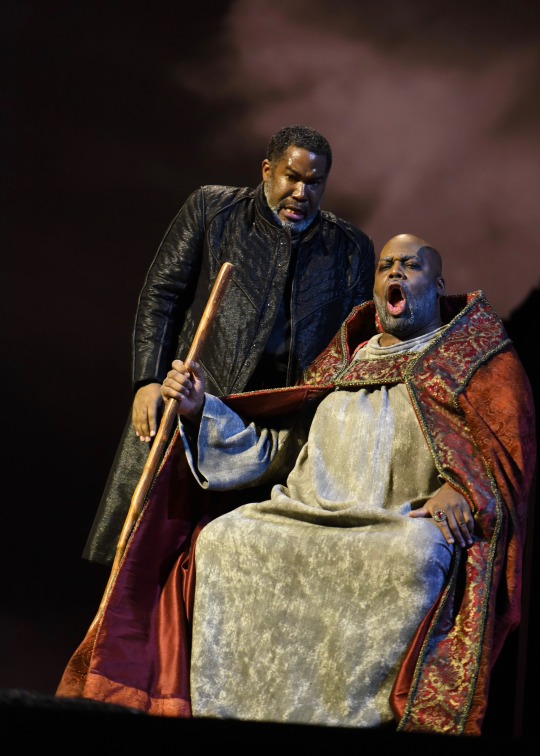
So, What’s Going On?
Spain, the mid-sixteenth century.
Our hero, Don Carlo isn’t doing well. The infante (een-FAHN-teh, basically a Spanish word for “prince”) can’t get along with his father, King Filippo II (fee-LEEP-poh), and, to top it off, Carlo has no real royal responsibilities to keep him busy.
Oh, and did we mention he’s in love with his stepmother?
Filippo had promised Carlo a beautiful French bride named Elisabetta (eh-leez-ah-BEHT-tah), but, at the last minute, the king swept in and married her himself. Not cool. Nope, definitely not cool.
Enter Rodrigo (ro-DREE-goh), a nobleman and Carlo’s best friend. Rodrigo tries to cheer Carlo up by getting him involved in a political cause (nothing says “distraction” like a revolution). Spanish-occupied Flanders, (present-day Belgium) Rodrigo explains, is badly oppressed and needs a leader ASAP. Having a lot of free time on his hands, Carlo agrees to act as “savior” to the Flemish (i.e., the folks from Flanders). Got it so far?
But there’s a catch. He’ll need his stepmom’s permission.
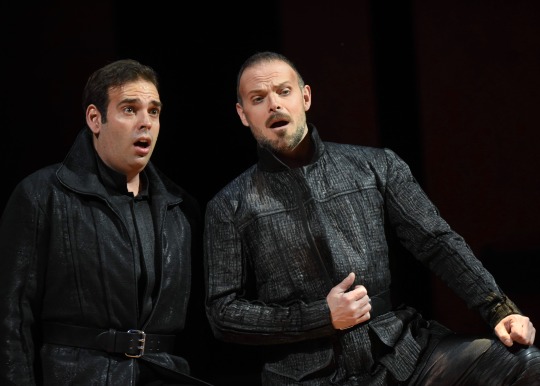
Rodrigo fires Carlo up for a Flemish fight.
Take a listen…
In one of opera’s most famous duets, Rodrigo and Don Carlo take a vow of friendship and promise to work together to achieve freedom for Flanders. Listen for the sounds of the brass instruments, symbolizing war and aggression, as well as royalty.
youtube
Back to the story…
Rodrigo arranges a meeting between Carlo and Elisabetta, telling the queen her heartbroken stepson needs a favor. But one of the queen’s ladies-in-waiting, the Princess of Eboli (EHB-oh-lee), overhears and takes Carlo’s heartbreak completely out of context—she thinks Carlo might be in love with her.

At the meeting set up by Rodrigo, Carlo tells Elisabetta he’s dying of love.
In other palace news, the king is highly suspicious of Elisabetta’s relationship with Carlo. He summons Rodrigo and asks him to spy on Carlo and Elisabetta’s extracurricular activities. Rodrigo unwisely uses this moment to plead for Flanders, claiming the king is applying unnecessary force to maintain peace in the Flemish territories. Though slightly moved, Filippo warns Rodrigo his rebellious ways may get him into trouble with the Spanish Inquisition (…bet you weren’t expecting that).
Sometime later, Carlo receives a mysterious letter. Thinking Elisabetta wishes to see him, he waits for her in a romantic spot, and she promptly arrives wearing a veil for cover.
(Yeah, just kidding: It’s not really Elisabetta, but Eboli in disguise.)
Carlo whispers sweet nothings to “Elisabetta,” but when the mix-up comes to light, he tries to take back his professions of love. The damage is done, however—Eboli figures out Carlo’s words were meant for someone else…and that the “someone else” must be the queen.
Rodrigo rushes in. Believing Eboli will go straight to the king for revenge, he asks Carlo to hand over any incriminating evidence pertaining to Flanders.
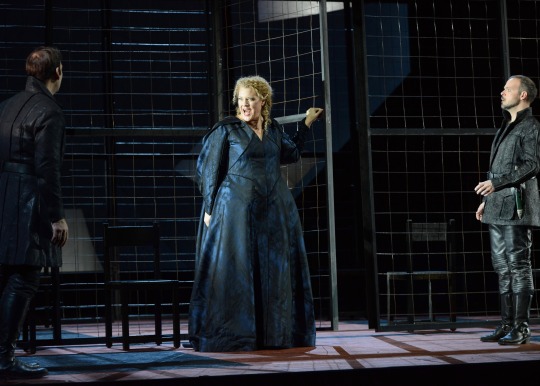
Eboli plots vengeance against Carlo for (accidentally) playing with her heart.
But tensions between Filippo and Carlo are about to boil over anyway. At an auto-da-fé (an execution led by the Inquisition and overseen by the king), Carlo interrupts the ceremony by bringing some Flemish citizens before Filippo to call the king out and beg for royal mercy. Things get heated, and Carlo draws his sword. Horrified by this treasonous act, Filippo calls for someone to arrest his son. To everyone’s surprise, Rodrigo steps forward and leads Carlo to jail.
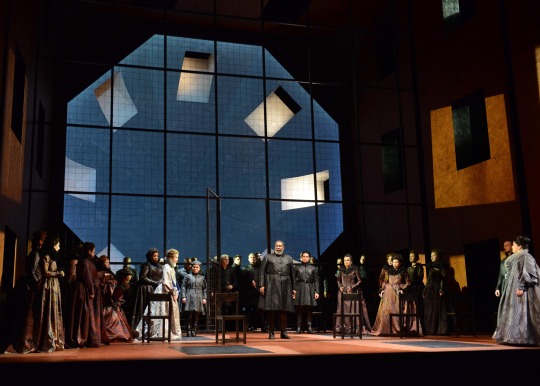
A private family feud is put on public display.
Take a listen…
In his aria, “Ella giammai m’amò” (“She never loved me”), Filippo contemplates the sad state of his marriage. Listen for the sorrowful string music, which repeats incessantly as if to reflect Filippo’s relentless thoughts.
youtube
Filippo wants Carlo out of the way (like…completely out of the way), so the king appeals to the Grand Inquisitor to ask if the holy man will pardon Filippo for ordering Carlo’s execution. Convinced the uprising of the Protestant-leaning Flemish—and not Carlo—is the real threat to Spain and to the Catholic Church, the Inquisitor slyly suggests Filippo may be absolved if he hands over the traitorous Rodrigo in exchange. Yikes.
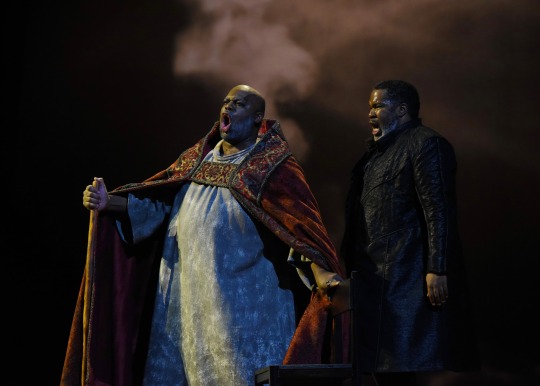
The Grand Inquisitor offers a terrible bargain: Religious blessing in exchange for Rodrigo’s demise.
Take a listen…
In this intentionally frightening scene, the Grand Inquisitor’s deep and forceful voice, along with the quivering strings and percussion, remind the audience (and Filippo) that the church wields power in sixteenth-century Spain.
youtube
Suddenly, Elisabetta bursts in claiming she’s been robbed. She asks her husband to take action against the culprit, but Filippo quickly admits to the crime himself. He then confronts Elisabetta about a portrait of Carlo she keeps hidden in her stolen jewelry box. Elisabetta maintains her innocence, however. She may love Carlo, but she’s never been unfaithful.
And yet here’s a twist: Filippo has.
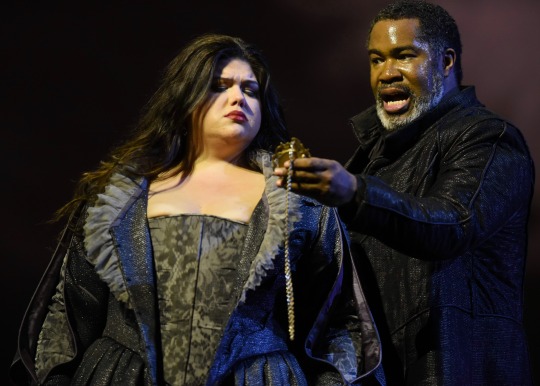
Filippo tries to shame Elisabetta.
While comforting the queen after Filippo’s accusation, Eboli confesses she’s been having an affair with the king and that jealousy (for both Carlo and Filippo) led her to steal Elisabetta’s box and throw some serious shade at the queen. Shocked, Elisabetta orders Eboli to head to a convent. Eboli searches for a way to make things right—and finds one. She stumbles onto Carlo’s death warrant and resolves to intervene before it’s too late.
Take a listen…
Eboli curses her own vanity for inspiring her to betray her queen in the aria “O don fatale” (“Oh fatal gift”). Check out how the mezzo-soprano uses both high and low notes to convey her sense of frustration and despair in the musical sample below. Also: Listen for the outbursts from the trumpets, trombones, and horns at the opening. Can you tell things have gotten pretty serious?
youtube
But can Eboli alert Carlo in time? Can Rodrigo escape the watchful eye of the Inquisition? And, most importantly, will Elisabetta and Carlo be allowed to ride off into the Spanish sunset?
Who’s Who
(Italian version of the original Spanish names listed; English version names in parentheses)
Don Carlo (Don Carlos) infante of Spain (tenor—the highest male voice)
Filippo (King Philip II) Carlo’s father and king of Spain (bass—the lowest male voice)
Elisabetta (Elizabeth of Valois) queen of Spain (soprano—the highest female voice)
The Princess of Eboli (known as “Eboli”) (mezzo-soprano—a middle-range female voice)
Rodrigo marquis of Posa and Carlo’s friend (baritone—a middle-range male voice)
The Grand Inquisitor (bass)
Good to Know
You’ve heard of the Spanish Inquisition before, right? No?
Okay, well, just in case you haven’t, you might want to keep in mind that the Spanish Inquisition was a Catholic branch of the Spanish government whose task was to find and “question” anyone who wasn’t loyal to the Catholic church, particularly Jews and Protestants. These “interviews” were often literal torture, as the Spanish monarchy was known to use the Inquisition as an excuse to enslave innocents in order to get free labor.
Now that you’re familiar with the Inquisition: Did you know King Philip II, his wife Elizabeth, his son Carlos, and the Princess of Eboli were also real? Philip II was a sixteenth-century Spanish monarch who did indeed marry a French woman (Elizabeth of Valois) whom he had initially intended for his son. Turns out Philip and Elizabeth actually had a reportedly happy marriage, and the love story between Elizabeth and her stepson was invented by writer Friedrich von Schiller in the eighteenth century and exploited by Verdi in the nineteenth century for maximum dramatic impact.
The Princess of Eboli was likewise a genuine attendant at court and the wife of King Philip’s right-hand man. Rodrigo, however, never actually existed; he’s more of an ideal representation of compassion and progressive thinking created by Schiller at a time when the Enlightenment ideals of reason and rationality swept across Europe.
And Carlos? Sadly the historical Carlos wasn’t quite the romantic hero he is in the opera. Rowdy, and unpredictable, the real-life Carlos was decidedly not in love with his stepmom. Yet, as in the opera, Carlos wasn’t given much power by his father and eventually grew fed up with life in Spain. The infante then demanded control over Flanders, which was being ruled by a brutal cardinal of the Catholic Inquisition.
Just like in the opera, Flanders was a place of political (and religious) unrest in the mid-sixteenth century. Absorbed into Spain’s considerable empire via a political marriage, Flanders was somewhat content to be ruled by Philip’s father, Charles V, who had been born in Flanders and was well respected there. Things changed when Philip assumed the throne, however: Philip was more Catholic than his father and the new king had no trouble sending clerical and military forces to keep the Protestant-friendly Flemish in line—often using violent methods of persuasion.
Philip ultimately deemed his son unfit to serve as ambassador to such an unstable region and had Carlos put in jail to prevent a political catastrophe (thanks, dad). Carlos died while under arrest, but the Flemish controversy continued, and uprisings followed soon after.
Check This Out…
Don Carlo features many melodies that repeat themselves to help the audience recall a particular scene or emotion from earlier in the story. Listen up for tunes that come back to haunt these characters again and again (especially the themes from Carlo and Rodrigo’s Act I duet, Carlo’s first lovesick solo, and the choir of horns that opens the opera).
Though Carlo is the title character, all the leading roles in the opera are given at least one aria (solo song) in which to express their feelings, and each character has their own unique musical and vocal style. Can you identify some of the ways in which Verdi gives each character his or her own spin? Is there a type of note (high, low, stretched out, cut short, etc.) or rhythm (slow, fast, galloping, etc.) that sticks out as being a specific character’s “signature sound”?
The finale of Don Carlo is notoriously open-ended, leaving much of the interpretation up to the performers and production team. Pay close attention during those final moments. What do you think the director and designers of this particular version wanted the audience to believe about the characters’ fates? Do you feel this explanation of the ending is correct? What do you think actually went down in the Spanish court?
Verdi wanted to immerse his audience in the culture and atmosphere of his operas. One of the ways he achieved this effect in Don Carlo was to include music that plays just off stage, giving the illusion of “surround sound” and extending the action of Don Carlo beyond the borders of the proscenium. Listen for the organ, church bells, brass band, choirs, and solo soprano voice coming from the wings of the theater. Do these help you feel like you’re at the heart of the story?
Think About This…
The dialogue between Filippo and the Grand Inquisitor—which was purposely added to the original story by Verdi and his librettists—includes some heavy musical clues regarding the evil subtext of the scene. In fact, Verdi uses ominous-sounding instruments to make it abundantly clear that some devilish plots are being hatched. What instruments stick out for you in this moment? What do you think Verdi’s position was regarding organized religion? What do you think he felt about monarchies like the one in Spain?
Eboli sings a song about a woman who hides her appearance and discovers a terrible secret. And…surprise! Later in the opera, the princess herself actually wears a veil and uncovers something about Don Carlo she wishes she hadn’t. Do you think the creators were making a specific point about disguises or about women who mask their identity?
Don Carlo is a mixture of big, crowded scenes for huge choruses and smaller, more intimate moments for four people or fewer. This contrast between public life and personal drama is something that continues to fascinate audiences in the twenty-first century. Can you name some recent films or TV shows in which the private struggles of a handful of characters are set against the backdrop of an overarching story that packs an epic and/or historical punch (hint: think The Crown or Game of Thrones minus the dragons)? Do they parallel Don Carlo in some way? Why do you think viewers are still drawn to these types of dramas?
Filippo, though tyrannical and misguided, is ultimately portrayed as a sad and lonely figure in the opera—thanks in large part to Verdi’s sympathetic music and also to the made-up love triangle between Filippo, his son, and his wife. Do you think Filippo’s desperate attempts to govern the lives of his family and his subjects are a response to his own feelings of helplessness? How do you think the other characters handle forces beyond their control (e.g., love, war, religious duty, honor, etc.)? Do you think anyone in the opera is more successful than Filippo at facing down these seemingly insurmountable challenges?
Take Action
As hinted above, the private actions in Don Carlo often have public consequences. Toward the end of the opera, Rodrigo, whose personal loyalties to the king and to Carlo are severely tested, ultimately chooses a path he feels will do the most good for the most people. In his beautiful final aria, he considers the type of legacy he wants to leave behind and asks that Carlo never forget him and never abandon the Flemish people. “Non ti scordar’” (“Do not forget”), he sings.
Take some time to think about how your own personal actions can affect public discourse or change. Research a group of people facing adversity like those in the Flemish territories mentioned in the opera (this could be a group you consider yourself a part of and/or strongly identify with, or it could also be a community you simply wish to help). Next, come up with a plan to spread the word and jumpstart a campaign to make a positive difference. Concerned for the people devastated by recent hurricanes, fires, and other natural disasters? Organize an afterschool meeting to educate your fellow students and to brainstorm fundraising ideas. Want to throw your support behind victims of abuse in a foreign nation? Set up a crowdsourced relief fund and ask family and friends to donate.
Want a wider audience for your social justice campaign? Use social media platforms like Twitter, Facebook, Instagram, Snapchat, or tumblr to get people talking about your cause and to post news and pictures of outreach events. If you decide to post, let us know by using the hashtag #donotforget.
Explore More
Go even deeper with the Don Carlo Extras.
–
Major support for WNO is provided by Jacqueline Badger Mars.
David M. Rubenstein is the Presenting Underwriter of WNO.
WNO acknowledges the longstanding generosity of Life Chairman Mrs. Eugene B. Casey.
WNO's Presenting Sponsor

Don Carlo is a production of the Clarice Smith Opera Series.
Additional support for Don Carlo is provided by The Dallas Morse Coors Foundation for the Performing Arts.
The Domingo-Cafritz Young Artist Program is made possible through the generous support of The Morris and Gwendolyn Cafritz Foundation, with additional funding provided by Judy and Billy Cox, Robert and Lynn Downing, Carl M. Freeman Foundation, Virginia McGehee Friend, Susan Carmel Lehrman, John & Mary Lee Malcolm, Michael F. and Noémi K. Neidorff and The Centene Charitable Foundation, Mr. and Mrs. Geoffrey P. Pohanka, Dr. Arthur and Mrs. Robin Sagoskin, Mr. Alan J. Savada and Mr. Will Stevenson, Dr. and Mrs. Guillermo Schultz, Mr. and Mrs. Michael R. Sonnenreich, Washington National Opera Council, and The Women’s Committee of Washington National Opera.
This performance is made possible by the Kimsey Endowment; The Morris and Gwendolyn Cafritz Foundation and the U.S. Department of Education.
Major support for educational programs at the Kennedy Center is provided by David M. Rubenstein through the Rubenstein Arts Access Program.
Kennedy Center education and related artistic programming is made possible through the generosity of the National Committee for the Performing Arts and the President's Advisory Committee on the Arts.
1 note
·
View note